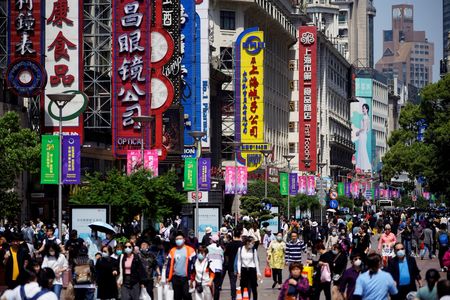 1
1 1
1

BEIJING (Reuters) – China’s factory-gate inflation cooled to its slowest pace in 14 months in May, official data showed on Friday, depressed by weak demand for steel, aluminium and other key industrial commodities due to tight COVID-19 curbs.
The producer price index (PPI) rose 6.4% year-on-year, the National Bureau of Statistics (NBS) said in a statement, after the 8.0% rise in April, and in line with forecasts in a Reuters poll. It was the weakest reading since March 2021.
The consumer price index (CPI) gained 2.1% from a year earlier in May, in line with April’s growth. In a Reuters poll, the CPI was expected to rise 2.2%.
The world’s second-largest economy has slowed significantly in recent months, hit by strict COVID-19 controls, disrupting supply chains and jolting production and consumption.
China’s cabinet in late May announced a package of 33 measures covering fiscal, financial, investment and industrial policies to revive its economy.
Last month, widespread COVID-19 lockdowns shut factories and stores, choking purchases of metals-intensive products from cars to appliances.
Chinese auto sales grew in May from April but were still down 16% year-on-year, according to the Chinese Passenger Car Association.
The urban jobless rate rose to 6.1% in April, the highest since February 2020 and well above the government’s target ceiling of 5.5%.
Beijing has taken a series of measures from cutting benchmark lending rates to allowing delays on loan repayments to arrest the economic slowdown.
Goldman Sachs last month lowered its 2022 growth forecast to 4% from 4.5%, below China’s official target of around 5.5%.
(Reporting by Lianging Gao, Ellen Zhang and Ryan Woo; Editing by Sam Holmes)